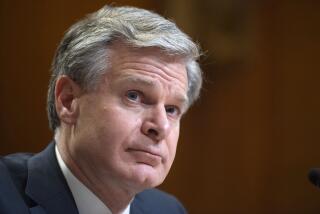EU leaders seek answers from U.S. on spying reports
- Share via
LONDON -- Distilling their anger over reports of U.S. spying on European citizens and governments, including heads of state, European Union leaders are calling for a meeting with U.S. officials on the matter before the end of the year.
In a statement issued by European Council President Herman van Rompuy and posted Friday on the EU’s website, the leaders summarized their discussions Thursday on allegations of National Security Agency monitoring of phone traffic across Europe.
The statement, supported by leaders of all 28 EU member states, backed a proposal by France and Germany leading to call for direct talks with U.S. officials. The heads of state of both nations are among 35 world leaders whose phones were believed to have been tapped by the NSA, according to reports of recently leaked U.S. government data.
Both countries now seek “bilateral talks with the USA with the aim of finding before the end of the year an understanding on mutual relations in that field. ... EU countries are welcome to join this initiative,” the statement said, adding that a resulting “lack of trust could prejudice the necessary cooperation in ... intelligence gathering.”
An EU report summarizing the main points of Thursday’s discussions stressed the importance of maintaining a transatlantic partnership. Though European heads of state and government “underlined the value of that partnership,” it said, “they expressed their conviction that the partnership must be based on respect and trust, including ... cooperation of secret services.”
At the conclusion of the first of two days of talks among European leaders in Brussels -- devoted chiefly to discussion on the alleged U.S. espionage tactics -- German Chancellor Angela Merkel said there was widespread concern across Europe, adding that the spying allegations could undermine U.S. relations with those nations.
“We informed each other about possible eavesdropping and expressed our concern as to what this meant for European citizens,” Merkel said during a news conference.
While acknowledging the need for intelligence work, she said the EU-U.S. partnership should “rest on mutual trust, on mutual respect ... that includes the work of respective intelligence communities.”
“Once the seeds of mistrust have been sewn, that doesn’t facilitate our work and cooperation. ... It makes it more difficult,” Merkel said, adding that that trust must now be rebuilt.
French President Francois Hollande was more blunt, saying at a separate news conference that “such practices cannot be accepted. Surveillance has been led by the American services ... [and] that this can apply to all citizens, including a number of European leaders, we need to put an end to it and we need some clarification.”
Italian President Enrico Letta said Thursday he wanted the “whole truth. ... It’s not minimally conceivable or acceptable that this kind of espionage activity can exist.”
Swedish prime minister Fredrik Reinfeldt also declared eavesdropping on allies “completely unacceptable.”
The reports concerning the alleged U.S. espionage come from the documents leaked to the Guardian newspaper by ex-NSA contractor Edward Snowden, who is now living in exile in Russia. According to the documents, the NSA had encouraged U.S. government offices to hand over their contacts for various governments around the world, including the mobile phone numbers of 35 heads of state, suggesting their phone communications had been intercepted.
ALSO:
Mexico: Fatal explosion at candy factory in Ciudad Juarez
Egyptian comic praised by Jon Stewart goes back into the fray
Two Americans taken hostage by pirates off the coast of Nigeria
Stobart is a news assistant in The Times’ London bureau.
More to Read
Sign up for Essential California
The most important California stories and recommendations in your inbox every morning.
You may occasionally receive promotional content from the Los Angeles Times.










